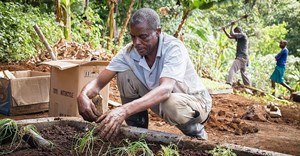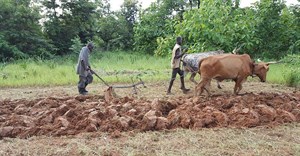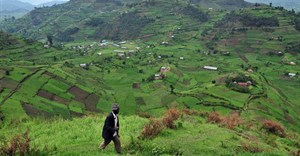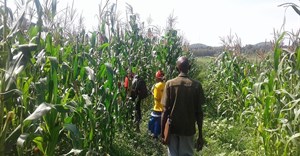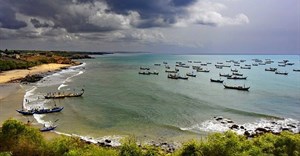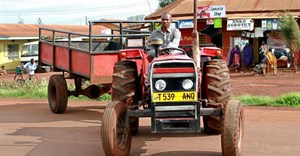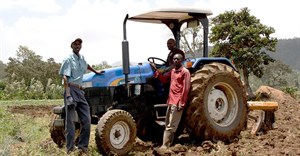Development: Investment in small farmers crucial in Africa
This position emerged at the World Economic Forum on Africa which concluded on Thursday, 12 June 2009.
"We have approximately 80 million small-scale farmers in Africa who produce very little - not because they do not want to be more productive, but because they are not able to," argued lobbyist for genetic modification technology and former Monsanto biotechnologist, Florence Wambugu.
Her organisation, Africa Harvest Biotech Foundation which is based in Kenya, promotes the use of biotechnology. "Raising these farmers' productivity is possible and it is key to the Africa's food security and overall economic growth," Wambugu added.
Numerous obstacles face small-scale farmers in Africa, she told IPS. These vary from a lack of infrastructure to no access to credit and new technology and little or no support from government and financial institutions.
Kofi Annan, chairperson of the Board of the Alliance for a Green Revolution in Africa (AGRA), acknowledged this.
"The average African small holding farmer swims alone," the former secretary general to the United Nations stated. "She has no insurance against erratic weather patterns, gets no subsidies and has no access to credit. I say ‘she' because the majority of small-scale farmers in Africa are women."
AGRA is a non-governmental organisation that aims to alleviate poverty among Africa's small-scale farming communities.
Nick Moon, co-founder of Kickstart International - a non-profit organisation that develops low-cost technologies for cash- poor farmers - stressed that poor irrigation infrastructure plays an important role in the farmers' hardship and the food insecurity in the region.
"Only four to five percent of agricultural land in Africa is irrigated. The rest is rain fed," he said. Few small-holding farmers in sub-Saharan Africa "live in close proximity to a water source, whether it is ground or surface water. This is a problem, especially because of climate change.
"Therefore, when addressing the needs of small scale farming, more attention should go to water and irrigation infrastructure."
Access to markets is crucial when it comes to empowering poor farming African communities, Wambugu added. "Many struggle with marketing their produce," she said.
"International trade barriers to protect farmers in rich countries definitely play a role but the existing regional tariffs are also obstacles," she argued. "Creating a regional market for African products will stimulate their production as they are enabled to sell their surplus and we improve the continent's food security and thus the overall economy."
Statistics by African Economic Outlook, which provides economic information and analysis on Africa's economies, indicate that intra-African trade in 2008 amounted to 424,14 billion dollars of which 17.1 percent was accounted for by agriculture.
During the WEF on Africa meeting, it was also argued that African governments - apart from opening their markets for agricultural products from elsewhere on the continent - should keep their promise of spending 10 percent of their budgets on agriculture.
In 2003, with the Maputo Declaration, African leaders committed themselves to national budget allocations of 10 percent to agriculture by 2008 as part of their attempts to meet the first Millennium Development Goal - fighting hunger and poverty.
Six countries have met that goal so far, with the average spending on agriculture in the African Union being five to six percent.
One of the countries that are meeting this obligation is Rwanda.
"Agriculture is an important driver of economical development, especially in Africa where so many people rely on farming," Rwandan president Paul Kagame said.
"If you enable farmers to increase their productivity, you increase your gross national product (GDP) and you lift people out of poverty. Africa can become the world's breadbasket, but you need to work on it. Investing in agriculture is easier than to have millions of people starving," he added.
According to Wambugu it is important for African governments to focus more on rural development. "It is there where the majority of people live. By not making rural areas more attractive, people will continue flock to the cities hoping for a better life. This is not beneficial to the continent's food security."
Figures by the United Nations Centre for Human Settlements show that Africa's urbanisation rate of 3.5 per cent per year is the highest in the world and is predominantly triggered by rural poverty. It is estimated that by the year 2030, over half of the continent's population will live in cities and rural settlements.
South Africa is one of the countries that have pledged to put more energy in rural development.
In his first state of the nation addresse in June 2009, newly elected president Jacob Zuma said that by "working together with our people in the rural areas, we will ensure a comprehensive rural development strategy linked to land and agrarian reform and food security.
"People in the rural areas have a right to be helped with farming so that they can grow vegetables and other things and raise livestock so that they can feed themselves."
Wambugu applauds these promises. "This change of mindset is needed across the continent. Rural-based development is the way forward for Africa."
Article published courtesy of IPS Africa



